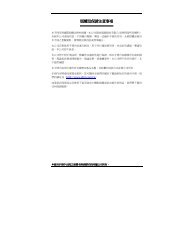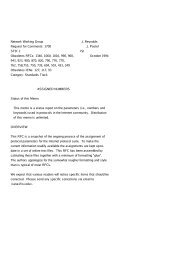Network Working Group R. Fielding Request for Comments: 2616 ...
Network Working Group R. Fielding Request for Comments: 2616 ...
Network Working Group R. Fielding Request for Comments: 2616 ...
You also want an ePaper? Increase the reach of your titles
YUMPU automatically turns print PDFs into web optimized ePapers that Google loves.
the <strong>Request</strong>-URI, and the network location of the URI (authority) MUSTbe transmitted in a Host header field. For example, a client wishingto retrieve the resource above directly from the origin server wouldcreate a TCP connection to port 80 of the host "www.w3.org" and sendthe lines:GET /pub/WWW/TheProject.html HTTP/1.1Host: www.w3.orgfollowed by the remainder of the <strong>Request</strong>. Note that the absolute pathcannot be empty; if none is present in the original URI, it MUST begiven as "/" (the server root).The <strong>Request</strong>-URI is transmitted in the <strong>for</strong>mat specified in section3.2.1. If the <strong>Request</strong>-URI is encoded using the "% HEX HEX" encoding[42], the origin server MUST decode the <strong>Request</strong>-URI in order toproperly interpret the request. Servers SHOULD respond to invalid<strong>Request</strong>-URIs with an appropriate status code.A transparent proxy MUST NOT rewrite the "abs_path" part of thereceived <strong>Request</strong>-URI when <strong>for</strong>warding it to the next inbound server,except as noted above to replace a null abs_path with "/".Note: The "no rewrite" rule prevents the proxy from changing themeaning of the request when the origin server is improperly usinga non-reserved URI character <strong>for</strong> a reserved purpose. Implementorsshould be aware that some pre-HTTP/1.1 proxies have been known torewrite the <strong>Request</strong>-URI.<strong>Fielding</strong>, et al. Standards Track [Page 37]RFC <strong>2616</strong> HTTP/1.1 June 19995.2 The Resource Identified by a <strong>Request</strong>The exact resource identified by an Internet request is determined byexamining both the <strong>Request</strong>-URI and the Host header field.An origin server that does not allow resources to differ by therequested host MAY ignore the Host header field value whendetermining the resource identified by an HTTP/1.1 request. (But seesection 19.6.1.1 <strong>for</strong> other requirements on Host support in HTTP/1.1.)An origin server that does differentiate resources based on the hostrequested (sometimes referred to as virtual hosts or vanity host













